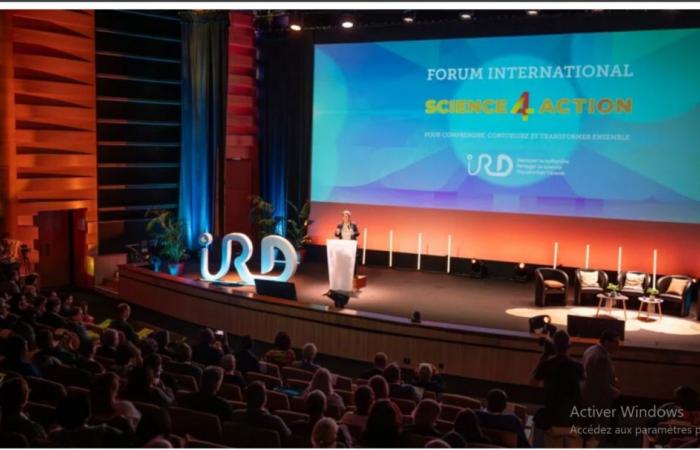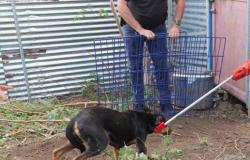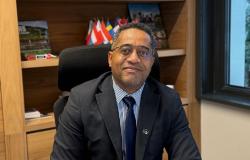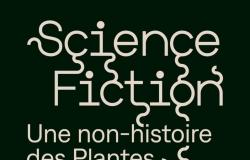The researcher spoke thus during the round table on the “role of scientists in transforming societies”organized in Marseille on October 7, 2024 and broadcast online. A round table which was part of the forum « Science 4 Action » marking the 80th anniversary of the Institute of Research for Development (IRD).
He said that in recent years in Tunisia, scientists have often been called upon. “The voice of the scientist is found at the level of the councils of ministers, of the highest officials…” affirms Hakim Gabtni
“We cannot have democracy without education, we cannot have education without citizenship, we cannot have all this without science”
François Taddei, « Learning Planet Institute »Paris Cité University
By way of illustration, he points out that in this North African country, the dams have almost dried up since September due to climate change.
“Farmers who consume 80% of water have fallen back on groundwater, with thousands of illegal drilling operations. And so, to convince farmers that we must stop this, we must convince them with scientific arguments on the ground. We have shown that there is a drying up of the sources, that there is a salinization of the water tables and, little by little, they are convinced,” he relates.
He adds that “we are also trying to convince them to change their type of agriculture to use, for example, resilient or ancestral tomato varieties that use little water; to carry out phytoremediation of their soils using, for example, plants that can extract salt from the soil…”
“I think that during times of crisis related to water or food security for example, scientists have their place and decision-makers are obliged to call them because they can be intermediaries with society,” concludes the researcher.
Create alliances
The panelists recalled that scientists certainly play an essential role, but they cannot transform societies alone. “If they know how to create alliances with other communities, it’s possible,” says François Taddei, founder and president of the « Learning Planet Institute »an association of Paris Cité University which “explores, experiments and shares new ways of learning and cooperating in order to meet the needs of youth and the planet. »
According to his explanations, we saw the same thing during the Age of Enlightenment where we had an alliance between the academies, including the academies of sciences, but also the academies of arts, letters to reinvent this combination that Condorcet (former deputy French, editor’s note) defined very well.
“He said that we cannot have democracy without education, that we cannot have education without citizenship, that we cannot have all of this without science,” reports François Taddei.
For the latter, this package has been used several times in history, “we just have to reinvent it again today (…) The question today is to create a planetary citizenship, which we could call a “planetownership”an ability to think beyond the walls of the city to think about the borders of the planet,” he argues.
Beyond reinventing science, it should be made more “participatory and inclusive”, insists Michèle Mbo’o-Tchouawou, deputy director ofAfrican women in agricultural research and development (AWARD).
“Beyond the socio-cultural problems, the constraints of different kinds, there are many elements that confronted us. For example, the visibility of women’s research work and the empowerment of women in research,” she says.
“How can we start to think of inspiring models for our younger generations of researchers, and also create communities of practice, provide the possibility of equal access to scientific resources,” asks the researcher.
One solution proposed by AWARD is the development of capacity building programs on the continent, in order to develop models of scientific mentoring at different levels.
“I think there is above all this question of knowing how women reach leadership positions in research and how they influence public policies,” indicates Michèle Mbo’o-Tchouawou.
The idea, she explains, is to show that women can do research and that this can then be recognized, not only at the local level, but also at the national or regional level as being able to help find solutions to our problems on the continent.
Partnership
Above all, scientists should be able to identify the most transformative projects. To do this, we must put in place a partnership model, suggests Patricia Ricard, president of the Paul Ricard Oceanographic Institute (France).
“The scientist is great when he talks to others: other scientists, politicians, business leaders, NGOs… We cannot do everything, all the time… There must be the four pillars of society”, she said.
Patricia Ricard believes that we also need funding for research through philanthropy. “Public-private partnerships are great, but when you add a little dose of philanthropy, it’s the little thing that will make the difference, it’s the little thing that will bring time, because philanthropy , it brings money, but it brings time, because there is no very heavy reporting, there is no business plan…” she says.
By: Béatrice Longmene Kaze, Scidev






